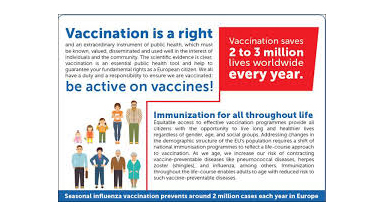I come from Italy where a well-known and widely used popular saying states "we are all adults and vaccinated", meaning that we are all able to speak openly about "taboo" subjects, but also that we do not get easily deceived into believing what’s not true.
Being adults and being vaccinated, according to this old popular way of saying, were synonymous of being safe and protected. Instead, people currently run the risk of being misled by the running fake news on vaccination, and this is a paradox no longer acceptable.
In these regards, I’d like to tell you what happened to me on Sunday November 18th, 2018.
A friend of mine from Malta, who like me is involved in a patients’ organization and who attended our training seminar on vaccination shared with me a link of an article of a local Italian newspaper which said “In 2014, three deaths in 48 hours after the vaccine. The Aifa stops influenza vaccine”. Shortly after, I found on the internet a press release of the Aifa, the Italian Agency of Drugs, dated 15th November 2018, entitled: "Influenza vaccine. AIFA: online old and misleading news”. I immediately sent the article to my friend to reassure her.
The same press release then appeared in an article of the same newspaper online.
Here is the integral text of the statement:
“The news of a prohibition of the use of flu vaccines by AIFA is circulating right in these hours on social media platforms (such as Facebook and Twitter), with clear alarmist intent of those who periodically relaunches it (especially during the national campaign for the flu vaccination). The quoted article, in reality, dates back to 2014 and reports news of deaths that were in no way correlated to the administration of the vaccines, as it has subsequently emerged from the scientific examinations conducted by the national and European authorities. It thus concerns misleading news that jeopardize the country’s campaign for the influenza vaccine, which is currently in progress.
AIFA reiterates the importance to get the vaccination against seasonal flu, especially for the more vulnerable people (above all the elderly and people of all the ages with underlying conditions that may increase the risk of complications when one has the flu), and to not let oneself be misled by fake news circulating on the web."
With concerns to this story, here are some remarks:
1) each one of us, when well-informed, represents a good antidote to the diffusion of fake news.
2) there is an evident monitoring issue if articles dated back to 2014 are enclosed in today's pages of a daily online newspaper that, even worst, only reports a small part of the development of the story. There is therefore a specific responsibility of the media, that are too little present in the current debate on vaccination.
3) the law enforcement action by the responsible authorities must be punctual and continuous, since every inactivity or delay may fuel people’s doubts.
4) there is a huge common job to do for “branding” as fake news, or “sweeping” away all those old information that can still be found online, as those that appeared yesterday in Italy, that at the time might have been written in good faith but that were never updated once the initial suspect for possible adverse effects had revealed completely unfounded. This is necessary also because the alarm that fake news provoke, as we have seen, has no borders. In this case, in fact, fakes news take the shape of bad, rotten food: long since expired but harmful if eaten today.
One of our commitment, as a European network, is to engage citizens and citizens’ associations around Europe to better implement vaccination policies, and we really want to contribute to build close collaboration and dialogue with European institutions and healthcare stakeholders, to determine how we can work together to valorize a more effective engagement of the civil society.
But how can institutions support the engagement of the civil society?
We have discussed potential solutions last November 7th, 2018, at the EU Parliament during an event entitled: “Active Citizens in Europe advocate for vaccination.”
- To the Coordinator of the EU Joint Action on Vaccination, we have asked to know how the Joint Action aims at guaranteeing the highest participation of organized civil society, namely the rules of engagement, if any, and we have obtained the inclusion of the representatives of the civil society. Otherwise, from our point of view, it is a "halved" Joint Action, a contradiction in terms.
- To the European Commission, we have asked and obtained that the Coalition for Vaccination, one of the 20 concrete actions included in the “Proposal for a Council Recommendation” on Strengthened Cooperation against Vaccine Preventable Diseases” (published by the EU Commission last April), will soon extend to all the civil society’s representatives engaged on the topic, instead of being open only to the European associations of healthcare workers and relevant students' associations in the field, as written in the document.
- Moreover, to the DG Santé we have asked to open an expert group on vaccination to be hosted on the European Health Policy Platform.
- A few months before the election of the new EU Parliament, we would like to know what is the commitment of EU Institutions to the topic of vaccination before and after the elections, and to keep the attention on the topic high, since vaccination must be at the top of the EU Health agenda and priorities. As we all know, prevention only represents 3% of all healthcare investments and vaccination represents just the 10% of this 3%. In addition, vaccination has been demonstrated to be one of the most cost-effective public health strategies. When talking about priorities on the political agenda, what weight do we want to give to prevention? The answer to this question will help us to understand what importance will be given to vaccination plans.
Mariano Votta, Director, Active Citizenship Network




